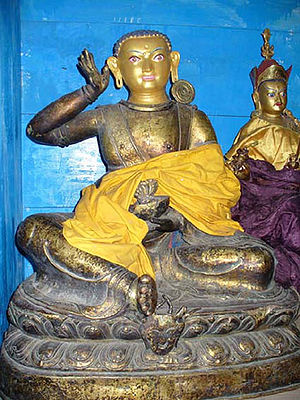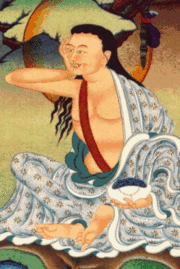Milarepa: Difference between revisions
m (→Tibetan) |
BenTremblay (talk | contribs) m (link to Ngok_Choku_Dorje) |
||
| Line 10: | Line 10: | ||
[[Image:Milarepa.gif|thumb|180px|right|'''Jetsun Milarepa''' (1040-1123)]] | [[Image:Milarepa.gif|thumb|180px|right|'''Jetsun Milarepa''' (1040-1123)]] | ||
[[Milarepa]] (1040-1123) was born in the Iron Dragon year of the first sexagenary cycle in a place called Kya Ngatsa in Gungtang in Upper Tibet. He first learned black magic and killed many enemies. Later, feeling remorse for his negative actions, he went to [[Lhodrak]] to meet the great [[Marpa]] Rinpoché. For about six years and eight months, [[Marpa]] made him undergo great hardship for the sake of the Dharma, such as building a nine storey tower, before he finally granted him all the empowerments and instructions. At the age of forty-five, in the Wood Mouse year (1084), he went to Upper Tibet, and for nine years, moved through Kyirong and Nyal. There he endured hardships, such as wearing only a simple cotton cloth and sustaining himself on nettles, and meditated with such fierce determination that he gained the supreme accomplishment within that very lifetime. Then he went to other places, coming and going, giving instructions of the Secret Mantra to those who were worthy disciples, and composing many songs of realisation. Among the many students he produced were [[Rechungpa]] and Dagpo Lhajé ([[Gampopa]]). He upheld the lineage of practice of [[Marpa|Marpa Rinpoche]], while Ngog Chöku Dorje, Tsurtön Wangi Dorje and Meton Tsonpo--who together with Milarepa form "The four great pillars" or main disciples of [[Marpa|Marpa Lotsawa]]--upheld the scriptural lineage,. Finally, in the Water Hare year of the second sexagenary cycle, he departed. | [[Milarepa]] (1040-1123) was born in the Iron Dragon year of the first sexagenary cycle in a place called Kya Ngatsa in Gungtang in Upper Tibet. He first learned black magic and killed many enemies. Later, feeling remorse for his negative actions, he went to [[Lhodrak]] to meet the great [[Marpa]] Rinpoché. For about six years and eight months, [[Marpa]] made him undergo great hardship for the sake of the Dharma, such as building a nine storey tower, before he finally granted him all the empowerments and instructions. At the age of forty-five, in the Wood Mouse year (1084), he went to Upper Tibet, and for nine years, moved through Kyirong and Nyal. There he endured hardships, such as wearing only a simple cotton cloth and sustaining himself on nettles, and meditated with such fierce determination that he gained the supreme accomplishment within that very lifetime. Then he went to other places, coming and going, giving instructions of the Secret Mantra to those who were worthy disciples, and composing many songs of realisation. Among the many students he produced were [[Rechungpa]] and Dagpo Lhajé ([[Gampopa]]). He upheld the lineage of practice of [[Marpa|Marpa Rinpoche]], while [[Ngok_Choku_Dorje|Ngog Chöku Dorje]], Tsurtön Wangi Dorje and Meton Tsonpo--who together with Milarepa form "The four great pillars" or main disciples of [[Marpa|Marpa Lotsawa]]--upheld the scriptural lineage,. Finally, in the Water Hare year of the second sexagenary cycle, he departed. | ||
(from ''sgrub brgyud shing rta chen mo brgyad kyi bsdus ‘grel'', Mirik Petrun Khang, 2000 p.496) | (from ''sgrub brgyud shing rta chen mo brgyad kyi bsdus ‘grel'', Mirik Petrun Khang, 2000 p.496) | ||
Revision as of 17:58, 3 July 2009
Famed yogi and patriarch of the Kagyu lineage. One of the most famous yogis and poets in Tibetan religious history. Most of the teachings of the Kagyu schools passed through him. He was the main disciple of Marpa, the translator. His two main students were his “sun-like” disciple Gampopa and his “moon-like“ disciple Rechungpa. The picture shows one of three very old and sacred statues of Milarepa which are kept in Lapchi (la phyi), one of the places where Milarepa stayed for a long time meditating in various caves. This particular one belonged to Tsang Nyon Heruka (gtsang smyon he ru ka), (1452-1507) who compiled and published Milarepa’s biography (mi la rnam thar) and spiritual songs (mi la mgur 'bum) while doing retreat in Lapchi in 1488.
Please expand this page by pressing EDIT above.
Short Bio
Milarepa (1040-1123) was born in the Iron Dragon year of the first sexagenary cycle in a place called Kya Ngatsa in Gungtang in Upper Tibet. He first learned black magic and killed many enemies. Later, feeling remorse for his negative actions, he went to Lhodrak to meet the great Marpa Rinpoché. For about six years and eight months, Marpa made him undergo great hardship for the sake of the Dharma, such as building a nine storey tower, before he finally granted him all the empowerments and instructions. At the age of forty-five, in the Wood Mouse year (1084), he went to Upper Tibet, and for nine years, moved through Kyirong and Nyal. There he endured hardships, such as wearing only a simple cotton cloth and sustaining himself on nettles, and meditated with such fierce determination that he gained the supreme accomplishment within that very lifetime. Then he went to other places, coming and going, giving instructions of the Secret Mantra to those who were worthy disciples, and composing many songs of realisation. Among the many students he produced were Rechungpa and Dagpo Lhajé (Gampopa). He upheld the lineage of practice of Marpa Rinpoche, while Ngog Chöku Dorje, Tsurtön Wangi Dorje and Meton Tsonpo--who together with Milarepa form "The four great pillars" or main disciples of Marpa Lotsawa--upheld the scriptural lineage,. Finally, in the Water Hare year of the second sexagenary cycle, he departed.
(from sgrub brgyud shing rta chen mo brgyad kyi bsdus ‘grel, Mirik Petrun Khang, 2000 p.496)
Literary Works
Main Teachers
Main Students
The eight great sons:
- Je Gampopa, the sun-like son
- Rechungpa, the moon-like son
and the star-like sons:
The thirteen close sons:
- Shengom Repa
- Lengom Repa
- Megom Repa
- Tsaphu Repa
- Kharchung Repa
- Rongchung Repa
- Taggom Repa Dorje Wangchuk
- Jogom Repa Darma Wangchuk
- Dampa Gyakphuwa
- Likor Charupa
- Lotön Gendün
- Kyotön Shakya Guna
- Dretön Tashi Bar
The four highly developed daughters:
Main Lineages
Alternate Names
Other Reference Sources
European Languages
- Tibet's Great Yogi Milarepa: A Biography from the Tibetan being the Jetsun-Kahbum or Biographical History of Jetsun-Milarepa, According to the Late Lama Kazi Dawa-Samdup's English Rendering; edited by W Y Evans Wentz ISBN 0195003012,
- Life of Milarepa; translated by Lobsang Lhalungpa; ISBN 0394726960,
- Biography of the Great Yogi Milarepa by Tsang Nyon Heruka; ISBN 0140193502
- Songs of Milarepa compiled by Tsang Nyon Heruka; ISBN 0486428141
- The Hundred Thousand Songs of Milarepa by Tsang Nyon Heruka; translated by Garma C.C. Chang; ISBN 1570624763
- Ten Teachings from 100,000 Songs of Milarepa by Thrangu Rinpoche, translated by Peter Roberts; ISBN 8170307007
- The Message Of Milarepa: New Light Upon The Tibetan Way; Translated by Humphrey Clarke
- Herr der Yogis, the first ever translation of the "mi la rnam thar" by Tsang Nyon Heruka directly from Tibetan into German by Thomas Roth, Sequoyah Verlag, Edition Mandarava, Austria, October 2006, ISBN 9783854660642
- Drinking the Mountain Stream: Songs of Tibet's Beloved Saint, Milarepa, Lama Kunga Thartse Rinpoche, ISBN 0861710630
Tibetan
- Tsang Nyon Heruka (gtsang smyon he ru ka). rje btsun mi la ras pa'i rnam thar dang mgur 'bum. Delhi: Tibetan Cultural & Religious Publication Centre (bod zhung shes rig dpar khang). (book format).

